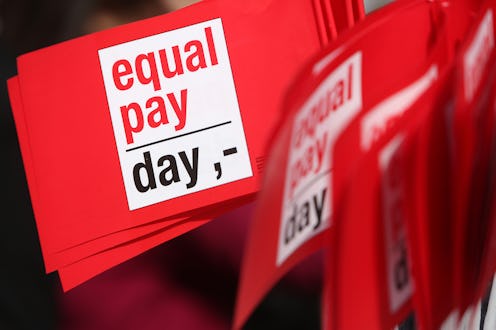News
April 4 Isn't Equal Pay Day For All Women

Tuesday marks Equal Pay Day in the United States, a day meant to pinpoint the additional amount of time it would, on average, take a woman to reach the same amount of earnings a man would have made in the previous calendar year. But, as Ellen McGirt points out on Fortune, April 4 is not truly Equal Pay Day for all women. Why? Because the commonly cited statistic asserting that American women make roughly 80 percent of what men do only applies to white women in comparison to white men. African American, Hispanic, and Native American women almost always earn less than white and Asian women, meaning Equal Pay Day for these groups would fall on dates later than April 4.
Last year, Equal Pay Day was nationally recognized on April 12. Asian American women, who earned an estimated 88 cents to the dollar, had Equal Pay Day fall nearly one month earlier on March 15. However, for black women, who earned 63 cents to the dollar, the day didn't arrive until August 23; Native American women, with their 59 cents to the dollar, had to wait until September 14; and finally, Latinas, who were paid 54 cents to the dollar, didn't reach the amount of earnings white men earned in 2015 until November 1 of the subsequent year.
While skeptics argue that the reasons between these differences in pay lies in the significant disparity of educated individuals within several communities of racial minorities. However, while it is true — according to the U.S. census — that white and Asian women are more likely to hold college degrees than black and Latina women, it's important to note that the wage gap between these demographics persists even when women with equally advanced educations are compared to women from other race groups.
According to the American Association of University Women, "While more education helps increase women’s earnings, it still doesn’t close the gender pay gap. Hispanic women are paid less than white and Asian women are, even when they have the same educational credentials."
Unfortunately, a 2016 study by the Economic Policy Institute reports that the racial wage gap, for both men and women, is actually widening in the United States. As a result, women of color predictably suffered greater consequences than men in the same position. "The widening gap has not affected everyone equally," reads the report. "Young black women (those with 0 to 10 years of experience) have been hardest hit since 2000."
While Equal Pay Day provides a useful opportunity to address the issue of unequal pay between the sexes, it's important to remember that the wage gap doesn't affect all women at the same rate.